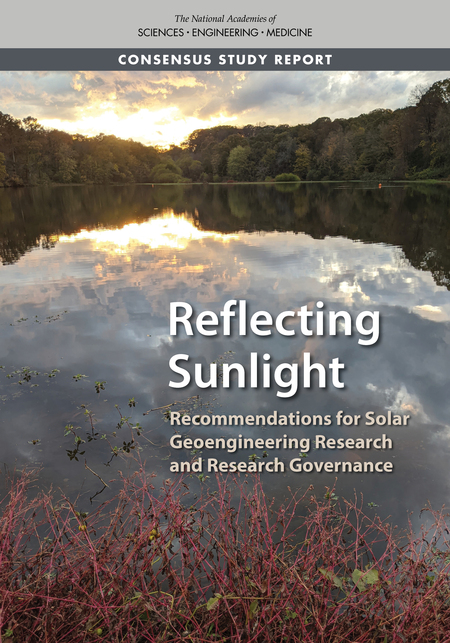Geoengineering
A Science-Policy Dialogue on SRM for Latin America
Key takeaways from the UCLA Emmett Institute’s convening on Solar Radiation Modification (SRM) in Santiago, Chile.
Though interventions like solar radiation modification (SRM) are increasingly breaking into mainstream conversations of climate change, the charged nature of this topic and political extremes that have characterized discussion around it make it difficult for policymakers and decision-makers to find neutral spaces to learn about existing research, ask questions, and brainstorm policy ideas with colleagues and trusted experts. Creating that neutral space was the goal of an Emmett …
Continue reading “A Science-Policy Dialogue on SRM for Latin America”
CONTINUE READINGThoughts on COP30
What have we learned about the future of climate negotiations?
we can only expect incremental progress from the U.N. unless or until China takes a leadership role, particularly while the U.S. is also on the sideline. Incremental progress is better than no progress, obviously. But we’re going to have to look elsewhere for productive international action.
Basically, that’s going to have to rely on something less than the international consensus that drives COP. That means doubling down on some other options: bilateral climate agreements between countries, action by coalitions of interested countries, and subnational agreements including states, provinces, and cities around the world.
CONTINUE READINGShould Private Firms Be Involved in Cooling the Planet?
Private firms like Stardust Solutions want to get in on planet-cooling interventions. Here’s the OK, the bad, and the ugly about startup involvement.
A story at Heatmap News last month reported that an Israeli-American startup firm, Stardust Solutions, has received $60 million in venture funding for a new type of particle they propose can be used to inject in the stratosphere to reflect a little sunlight and (temporarily, imperfectly) reduce global-average heating from greenhouse gases. The company aims …
Continue reading “Should Private Firms Be Involved in Cooling the Planet? “
CONTINUE READINGNew York Climate Weak
The Drain is a weekly roundup of environmental and climate news from Legal Planet.
Now is the time for courage. Now is not the time to pull punches or pull speakers. We need more speech — not enforced silence. That’s why I’m not a big fan of shutting down campus speakers, even those who might spread climate obstruction. Like Vicki Hollub, the CEO of Occidental Petroleum, who was being …
Continue reading “New York Climate Weak”
CONTINUE READINGRight-wing populist environmentalism?
The future of environmentalism may include a right-wing, populist strain that is heavily NIMBY
While there is a lot of focus on left-wing NIMBYs in public discourse, there’s also a lot of right-wing NIMBY mobilization too. For instance, the conservative California city of Huntington Beach is leading the resistance to state efforts to require upzoning to facilitate housing. Conservative rural communities are often the locus of opposition to both …
Continue reading “Right-wing populist environmentalism?”
CONTINUE READINGA Landmark Geoengineering Conversation in the Global South
The UCLA Emmett Institute helps sponsor and organize the Degrees Global Forum, the largest event of its kind to date.
I post periodically about developments in the debate over solar geoengineering (SRM) and its potential role in response to climate change. News accounts may suggest that this debate moves fast, but it has three enduring, large-scale themes. First, SRM presents high stakes for climate risks and response – which most governments thus far have been …
Continue reading “A Landmark Geoengineering Conversation in the Global South”
CONTINUE READINGWhy Stand Up for Science? Ask Kim Stanley Robinson
The acclaimed science fiction author says at a UCLA talk that Trump’s attack on science is “a murder suicide” that won’t work because “you cannot kill the future.”
One day before thousands of Americans took to the streets to protest cuts to scientific research, Kim Stanley Robinson gave a barn burner of a defense of science in the “Optimist Room” of a UCLA conference center. The author of “The Ministry for the Future,” “The Mars Trilogy,” and other books with scientists and climate …
Continue reading “Why Stand Up for Science? Ask Kim Stanley Robinson”
CONTINUE READINGThe 2024 Election Outcome Could Boost the Case for Geoengineering
A Trump victory would increase the odds that we will ultimately need to start blocking solar radiation as a last resort to limit climate change.
A Trump victory would increase the odds that we will eventually need to “break the glass and pull the red lever.” To be prepared for that possibility, we would also need to do more in the short term to research various forms of geoengineering, their feasibility, and their potential side effects. Basically, if you decide you’re going to start smoking a lot more cigarettes, you need to be prepared for the greater likelihood you’ll need chemo.
CONTINUE READINGAn Ethical Framework for Climate Intervention Research
Can the AGU’s new principles defuse controversy and enable responsible research?
Research into climate intervention techniques, especially solar geoengineering, has long been controversial. Scientists as well as publics and policy makers have been divided on its risks and merits. In recent years, experiments proposed or undertaken in the USA, Sweden and Mexico have triggered vociferous opposition. Growing and unregulated commercial interest in the technologies seems likely …
Continue reading “An Ethical Framework for Climate Intervention Research”
CONTINUE READINGStill Crazy After All These Years
There’s been an alarming growth of conspiracy theories, often antisemitic ones, to explain extreme weather events.
Were the Democrats or lithium mining companies or international bankers behind Hurricane Helene? Is geoengineering a conspiracy to take over the planet? These conspiracy theories abound — not just in the corners of the Internet but in political figures like RFK Jr. and Marjorie Taylor Greene. And they’re beginning to influence state legislatures, including one that just banned geoengineering.
CONTINUE READING












